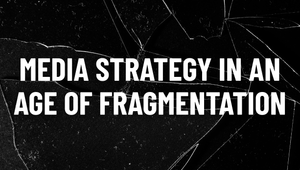
DEPT’s Strategic Navigators Are Turning Tariff Turmoil Into Opportunity

“This is the next covid moment,” says Andrew Dimitriou. “Last time it was a health pandemic. This time it’s a political dynamic... impacting both clients on this side of the Atlantic and certainly clients on the other side.”
It’s not hyperbole. In March, Donald Trump confirmed plans for sweeping new import tariffs, including proposed duties of up to 145% on Chinese goods. The move triggered alarm across global business networks – disrupting supply chains, rerouting commerce, and dragging marketing teams into a new cycle of uncertainty. Brands that manufacture in Europe and export to the US are reassessing their presence in the market – with some opting to pause shipments or explore strategic alternatives in response to new tariffs. US-based clients relying on Chinese production are calculating the cost of passing the difference onto consumers. And agencies, once again, are being asked to provide more than campaign thinking – they’re being asked for answers.
DEPT didn’t wait to be asked. By the Monday after Trump’s announcement, DEPT launched its Strategic Navigators unit – a cross-functional, 10-person team advising clients on how to act swiftly and decisively.
“This is sort of a personal project for me,” says Andrew, global chief client officer and growth officer at DEPT. “Because in times of crisis, our industry has a real opportunity to step up. We shouldn’t be beholden to the latest campaign or procurement negotiation – we’re here to drive growth in our clients’ businesses.”
Speed is usually the thing that agencies promise but struggle to deliver. In this case, DEPT moved in 72 hours.
As soon as Trump’s plan to ramp up tariffs was flagged publicly, back in the election race, DEPT’s leadership anticipated the fallout. “We started to think about what the potential impact would be for certain client bases,” Andrew recalls. “It could mean supply chain disruption. It could mean some strategic marketing levers need to be pulled to understand how much price elasticity is built into the brand, or how much they really want to push things forward into the consumer base.”
The timing wasn’t accidental. With proposed US tariffs on Chinese imports now reaching up to 145%, businesses across multiple categories were left scrambling. E-commerce and FMCG brands in particular – reliant on either US-China trade or US-bound exports from Europe – were hit early. Some DEPT clients have already stopped shipping to the US, prompting rapid shifts in supply chain strategy, media spend, and market focus.
But it wasn’t just about fast decisions. For DEPT, this was about building an advisory layer that could evolve alongside the situation. “We quickly came up with the fact that we need a dedicated team that’s constantly thinking about this holistically,” says Andrew. “From a brand angle, from a consumer angle, from a digital commerce angle, from a media angle.”
It’s a level of responsiveness that some agency networks or consultancy groups often struggle to match – and Andrew is clear about where DEPT’s value lies: “We operate in the marketing and technology services space. So we can think, and we can do – relatively quickly. And speed is a competitive advantage."
Tariffs are a blunt instrument. The response can’t be. DEPT’s real-time strategy unit isn’t offering one-size-fits-all advice. Instead, it’s tuned to the nuances of geography, industry, consumer sentiment, and operational reality. “Depending on where you're sat,” Andrew says, “the prism and consulting required will vary.”
Some brands, particularly in FMCG and retail, are responding tactically – pausing shipping into the US or switching focus to tariff-free products. “We’ve had to alter which products we’re promoting – because they’re less impacted by tariffs,” says Andrew. For those clients, DEPT is rebalancing product portfolios, reallocating media investment, and exploring alternative markets.
Others need more fundamental rethinking. If the supply chain is broken or paused, DEPT has to advise them appropriately. “We’re working with them on understanding: what new markets can we enter? What new channels should we go into? What does the marketing model look like?”
This is where DEPT’s structure becomes its differentiator. The unit draws on expertise across commerce, media, loyalty, CRM, and creativity – all under one roof. “It can’t be one-dimensional,” says Andrew. “You’ve got to look at it from a country perspective. You’ve got to look at it from a global perspective and a consumer perspective, and also a discipline perspective.”
It’s an approach designed to flex with each client’s specific exposure to the crisis. For a European cosmetics brand exporting to the US, the focus might be on re-establishing demand elsewhere. For a US business sourcing from China, it could mean mitigating increased costs through smarter promotion or bundled pricing. In every case, the thinking is multi-layered and scenario-based – built to evolve as the policy picture develops.
And as other brands reduce spend or go quiet, some see an opening. “This moment will work as an accelerant for certain businesses,” Andrew says. “Businesses that see it through an opportunity lens will benefit.”
But not every consequence of economic disruption shows up on a balance sheet. Some arrive in perception first – and in this case, in fewer airline bookings. “I was recently speaking to a couple of clients in the travel industry,” says Andrew. “And one of the unintended consequences is travel to the US has dropped. Ticket sales have plummeted from European-based clients – even though they’re not directly impacted. What does ‘brand America’ mean now, and what does that mean for people that want to go visit?”
It’s not a feeling. According to data cited by Kayak co-founder Paul English, European travel to the US dropped sharply in March. Western European arrivals fell 17% year-on-year, with countries like Ireland, Norway and Germany seeing declines of more than 20%. Overall overseas visitation to the US was down 12% – the steepest drop since March 2021.
For DEPT’s clients in this space, that means adjusting not only routes or pricing, but messaging. It also raises a broader point: when government policy begins to shape brand image and consumer intent at this scale, the role of marketing becomes as reputational as it is commercial.
As tariffs hit supply chains and inflate costs, many companies are finding their options limited. But one lever remains within reach: marketing. “Companies have fewer and fewer levers at their disposal,” Andrew says. “But marketing is definitely one of them.”
That might seem like a convenient argument from someone in the agency world, but it’s proving true in practice. As businesses adjust pricing models, pivot to promote particular products or services or exit certain markets altogether, they’re relying on marketing to communicate clearly, preserve trust, and reframe brand value in a new economic reality.
For some DEPT clients, the challenge is explaining why prices are going up without alienating consumers. For others, it’s about diverting attention toward products that remain unaffected by tariffs. And in certain cases – particularly where distribution is being paused or rerouted – it’s about building relevance in entirely new regions.
This is where DEPT’s advisory unit is stepping in with real-time scenario planning and fast execution. “No brand that I’m aware of can bear a 145% price increase,” says Andrew. “So we’re helping clients decide what to push, where to push it, and how to frame that to consumers – from media to CRM to retail partnerships.”
It’s also where the difference between strategy and action becomes critical. “I’m pretty sure my client doesn’t want a presentation about things they can potentially do in 90 days,” he adds. “We don’t have 90 days. We have to be able to think fast, do fast, and change fast.”
For DEPT, this moment is a proof point – not just for speed, but for relevance. The agency is making the case that marketing isn’t something to pause when budgets tighten. It’s a lever to pull, intelligently and fast, when the landscape shifts.
Every crisis accelerates something. For covid-19, it was digital transformation. For this moment, Andrew believes, it’s AI.
“What covid did for digital transformation, maybe this will do for AI,” he says. “Whether that’s how we’re deploying more effective, personalised content at scale that’s performance-based and in real time with media, whether that’s helping clients be more efficient in entering new markets, or whether we’re deploying AI learnings in real time to optimise based on product availability – these are areas where AI can play a big role.”
In some cases, AI is being used to dynamically optimise product visibility based on stock levels or tariff exposure. In others, it’s helping creative and performance teams align on faster go-to-market testing. And as companies search for efficiencies in tighter conditions, interest in loyalty and CRM automation is spiking – especially for brands looking to retain more value from existing customers.
Andrew is clear-eyed about the broader implications: “I think the smart and the impatient will seize the chance to create a competitive advantage long term – like we had a new set of competitors post-covid.”
This isn’t the first time marketers have faced disruption – but it’s a clear case of how the agency’s role is evolving. “This moment will work as an accelerant for certain businesses,” Andrew says. “And I feel businesses that see it through an opportunity lens will benefit.”
Optimism runs through the core of the action DEPT is taking right now and Andrew is driving that. “I think we owe that to society at large, to be honest,” he adds. “There’s enough pessimism going on in the broader media landscape – we don’t need to contribute to it.
“In times of crisis, I think agencies like ours can flourish. And the industry as a whole has a chance to step up and reposition itself from being sidelined or overlooked to actually leading again.”















